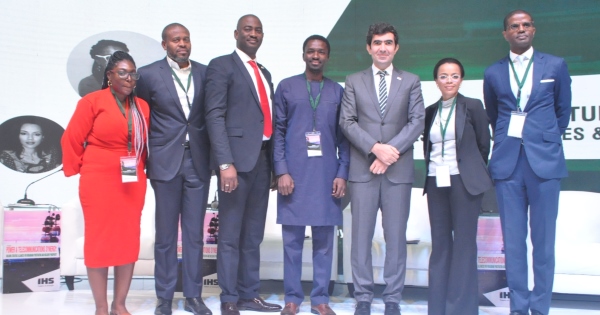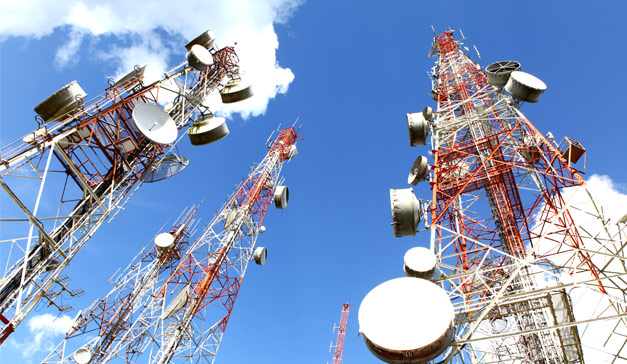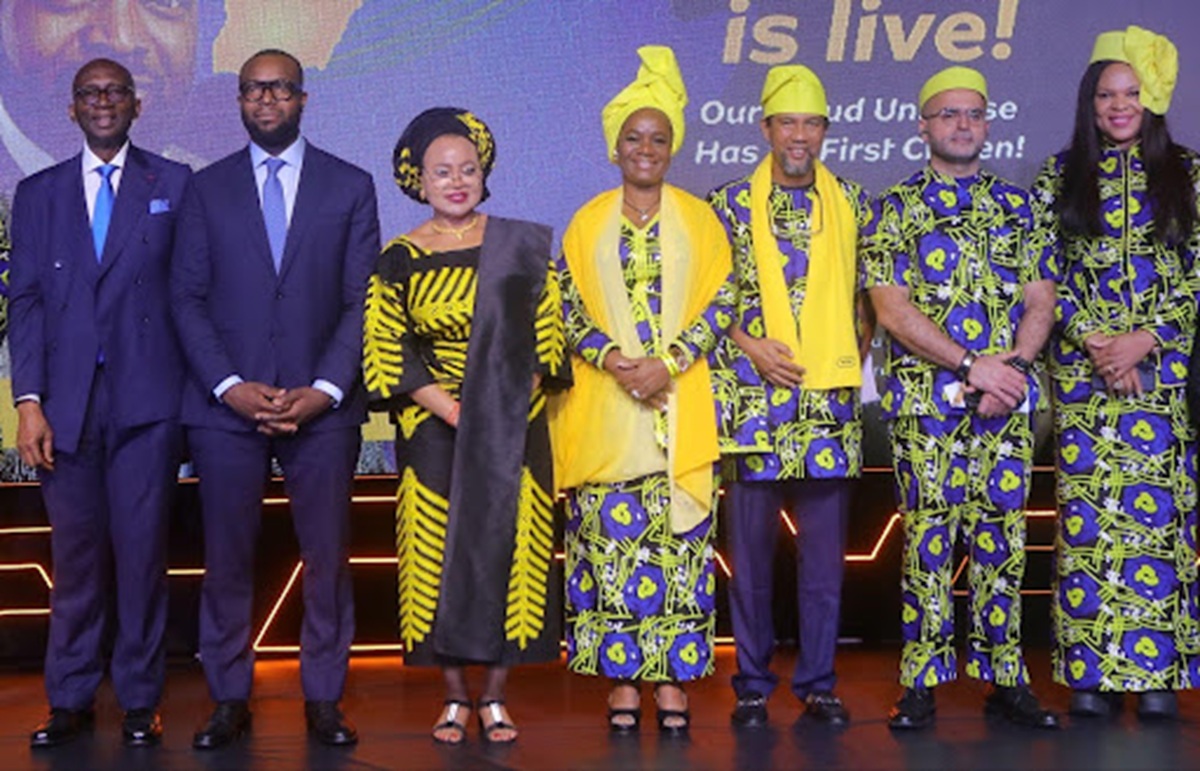Telecom
Telcos, Power Experts Discuss Strategic Alliances at the 2019 Power & Telecommunications Synergy Conference

Over 500 stakeholders in the telecommunications and power sectors convened today for the Power and Telecommunications Synergy Conference, sponsored by IHS Nigeria and organised by Thistle Praxis.
The event was held at the Landmark Event Center in Lagos and was designed to explore the benefits of integrating power solutions into the Nigerian Broadband Plan (NBP). Over 50 companies attended with representatives from a diversity of sectors including power, ICT and telecommunications alongside the government.
The conference themed Power and Telecommunications Synergy: Building Strategic Alliances for Broadband Penetration and Inclusive Prosperity presented a rare opportunity for participants to engage in constructive and interactive sessions on the NBP with industry experts and decision makers in the technology sector.
Discussions concentrated on the possibilities of integrating power solutions to achieve the NBP and bring about shared prosperity through the United Nations Sustainable Development Goals.
The program included three-panel discussions, two break-out sessions, thirteen exhibitions and a master class, with the expectation of building critical working groups to generate ideas and scalable solutions. The conference addressed issues such as building harmonized regulations, investment sourcing and optimization of returns for broadband infrastructure.
Commenting on the event, Mohamad Darwish, IHS Towers Senior Vice President, Co-founder and IHS Nigeria CEO, said, “This conference was strategically designed to provide insightful and constructive solutions to help achieve the nation’s vision for broadband growth and inclusive prosperity.
The telecommunications sector is of ultimate importance to the economic growth of Nigeria. We are excited to be part of those broader solutions emerging from the power and telecommunications sector to address the country’s major challenges and those of West Africa at large.”
Darwish stressed the need for both private and public sectors to collaborate on driving forward innovative solutions that will enable Nigeria to meet its growing demand for broadband connectivity.
“As of March 2019, according to the Nigerian Communications Commission (NCC), broadband penetration in Nigeria was pegged at 33% and an increase to the 70% target will require everyone’s efforts. This endeavour is too complex to be addressed solely by governments, operators or society. This needs to be a shared goal. We must all work together to achieve connectivity nationwide.” Darwish said.
Also commenting was Professor Umar Danbatta, NCC Executive Vice Chairman, who said, “We are thrilled to have been a part of the Conference. Platforms like this are essential to both the growth of the industry and the overall economy. Prior to 2001, when Nigeria’s telecommunication sector was deregulated, Nigeria had only approximately 700,000 lines and was unable to meet the growing demand for telecommunications services.
Since then, the telecoms industry has witnessed significant growth and progress; but it is important that we collectively seek ways to further improve the telecoms sector to drive opportunities and investment.”
Reiterating his remarks, Professor James Momoh, Chairman, Nigerian Electricity Regulation Commission said, “The power and telecommunications sectors are key economic pillars in Nigeria. Paying attention to their growth and development will only further the diversification of our economy.
This conference was enlightening in terms of the various ways in which we can expand within and outside of our industry. It addressed key concerns that will ultimately lead to a better understanding of both industries. It provided insight through engaging sessions with experts, which I believe will have significant impact in the near future.”
The Conference hosted the largest gathering of experts within the power and telecommunications industry to try to ensure the continued development of Nigeria’s telecommunications industry.
Telecom
Operators Seek Action Over Persistent Vandalization of Telecommunications Infrastructure Across Nigeria

The Association of Licensed Telecommunications Operators of Nigeria (ALTON) has expressed deep concern over the increasing wave of vandalization and theft of telecommunications infrastructure across the country.

According to a statement signed by Engr. Gbenga Adebayo, chairman, ALTON, “since the Federal Government’s decisive interventions earlier this year to support industry sustainability, our members have committed unprecedented levels of investment in network optimization and capacity upgrades. New systems are being deployed, transmission equipment modernized, power systems overhauled, and thousands of kilometers of fiber optic networks currently being laid and expanded.
“Our industry has not seen this scale of investment in recent years. We are working round the clock to improve the quality of service nationwide and we cannot afford these setbacks.
“Unfortunately, between May and July, 2025, multiple incidents of vandalism were recorded across cell sites in Rivers, Ogun, Osun, Imo, Kogi, Ekiti, Lagos, Federal Capital Territory Abuja and many other states.
“These acts of sabotage have significantly disrupted network services, causing widespread connectivity blackouts leading to degradation of services and severely impacting millions of subscribers”.
He noted that, the affected infrastructure, primarily belong to ALTON members, as well as other network operators and those who depend on operators for connectivity.
He said identified critical components targeted to include; power cables, rectifiers, fiber optic cables, feeder cables, diesel generators, batteries, and solar systems are vandalized and stolen from active sites.
“These are not mere materials, but they are the backbone of our digital economy, security systems, and national communications grid.
“We are alarmed at the frequency, intensity, and geographical spread of these incidents. States such as Delta, Rivers, Cross Rivers, Akwa Ibom, Ogun, Ondo, Edo, Lagos, Kogi, FCT, Kaduna, Niger, Osun, Kwara and Federal Capital Territory, Abuja have recorded the highest number of attacks on telecom infrastructure. These attacks have led to prolonged downtimes, network congestion, widespread blackouts, and degradation of service quality.
The public he said, must be reminded that telecommunications infrastructure is classified as Critical National Infrastructure (CNI) under the National Security framework. This classification is backed by Federal Government Gazette No. 133, Volume 108, dated 17th March 2021. Vandalism, sabotage, or illegal possession of these assets is a serious criminal offense with grave consequences.
ALTON expressed concerned about the rising market for stolen telecom equipment, such as:
– Power Cables, Power rectifiers, which are stolen from base station and sold into open markets
– Batteries which are stolen from base stations and sold for home and office inverters.
– Solar panels that are stripped from telecom sites and resold to unsuspecting households.
– Diesel fuel being siphoned from sites and traded on the grey market.
“We urge the public to be vigilant and refrain from purchasing suspicious items. If you buy stolen telecom equipment, you are not just complicit you are part of the crime.
We appeal to every Nigerian to please join us in the fight against the vandalization of telecom infrastructure.
“These assets serve us all, they enable our banking systems, security infrastructure, emergency response, education, health services, and the very platforms that power daily communication. An attack on telecom infrastructure is an attack on our economy and our security.
“A second, recurring and deeply worrying issue is the widespread damage to underground fiber optic cables caused by road construction and related civil infrastructure projects along major highways and urban roads. These activities have led to significant service outages and financial losses,” he added.
ALTON called on: – the Office of the National Security Adviser (ONSA), the Inspector General of Police, the Director General, Department of State Services (DSS), and the Commandant General of the Nigeria Security and Civil Defence Corps (NSCDC)
to immediately deploy the necessary resources to protect telecommunications infrastructure and prevent a total breakdown of communications across the country.
“We commend the Nigerian Communications Commission (NCC) for its proactive efforts in safeguarding national telecom infrastructure, particularly through the creation of a dedicated reporting portal.
“This initiative empowers citizens to play an active role in protecting critical assets by reporting incidents of vandalism or suspicious activity via protect@ncc.gov.ng or by dialing 622.
“Such forward-thinking measures are vital to ensuring the resilience and security of our communications network. This is a desperate and urgent hour. The industry cannot fight this battle alone. We need coordinated national action by the security agencies, the government at all levels, regulators, the media, civil society, and the public. Our national security, economic stability, and digital future depend on it,” the statement noted.
Telecom
MTN’s $150m Data Hub Gets Government Nod for Advancing Digital Economy

At the unveiling of MTN Nigeria’s Dabengwa Data Centre and Cloud Launch in Ikeja, Lagos, recently, Dr. Bosun Tijani, Honourable Minister of Communications, Innovation and Digital Economy, described the facility as an investment aligned with President Bola Tinubu’s agenda to grow Nigeria’s digital economy.

Tijani, who graced the event, commended MTN Nigeria for its continued investment in the country, noting that the new data centre – estimated to cost around $150 million – is the kind of technological infrastructure that supports the $1 trillion economy the current administration aims to build.
“An investment like this, the one we are here to launch, offers a platform for our young people to thrive,” Tijani said. He continued: “Enterprise-grade infrastructure like this, on our soil, gives startups, developers, and digital creators the ability to build and scale from Nigeria to the world. With this facility, MTN is reinforcing its position as Nigeria’s digital backbone.
The data centre, named after the late Sifiso Dabengwa, a former CEO of MTN Nigeria and later Group Chief Operating Officer before his passing in September last year is being hailed as Nigeria’s largest prefabricated modular data centre It will deliver 4.5 MW in phase 1, with an additional 4.5 MW to be delivered in phase 2, which is expected to be completed soon.
According to the Minister, the MTN Data Centre will contribute to growing Nigeria’s economy by “unlocking productivity, hiring enterprise, and driving diversification through technological innovation and inclusion.”
“For this reason, if you don’t mind,” he added, “let’s rise and give a round of applause to MTN for their consistent commitment to Nigeria. The administration of President Bola Tinubu recognises that we cannot build a modern, diversified economy without modern infrastructure – both physical and digital.”
In his welcome address, Karl Toriola, CEO of MTN Nigeria, thanked the Federal Government for its continued support and reiterated the company’s commitment to long-term investment in the country.
“We are committed to building locally managed, globally competitive digital platforms that will enable businesses to scale faster and engage more people in wide-ranging research and development.
“At MTN, we believe everyone, particularly Nigerians and Africans, deserves the benefits of a modern, connected life. We continue to push boundaries to make the humanly impossible, conceivable, feasible, and ultimately possible,” he said.
The unveiling ceremony drew other stakeholders, policymakers, and members of the public sector, all of whom applauded MTN’s bold move, not just as a telecom giant, but as a leader in Nigeria’s tech ecosystem, providing a platform to accelerate digital transformation and innovation.
Dr. Aminu Maida, Executive Vice Chairman and CEO of the Nigerian Communications Commission (NCC), represented by Engr. Babagaba Digima, Deputy Director, New Media and Information Security Department, said: “Today marks a significant milestone in Nigeria’s digital sovereignty and technological independence. The infrastructure we celebrate today embodies our collective vision of a digitally empowered Nigeria.”
Commending MTN’s leadership in digital innovation, Engr. Digima noted, “The Commission remains committed to creating an environment that supports innovation while ensuring the highest standards of cybersecurity, data protection, and robust internet infrastructure. We will continue to work closely with operators to ensure that the deployment of critical infrastructure meets the high standards our digital economy deserves.
Lagos State Governor, Babajide Olusola Sanwo-Olu, represented by Barr. Bimbola Salu-Hundeyin, Secretary to the State Government, said the Dabengwa Sifiso Data Centre “not only signifies MTN’s unwavering commitment to investing in Nigeria’s digital infrastructure but also reinforces the strategic importance of Lagos as a technology and innovation hub for the nation.”
“As we all know, data is the new oil, and cloud technology is the engine that drives it. With its Tier III facilities, MTN is raising the bar for secure, scalable, and efficient enterprise services, critical enablers for businesses, public services, and national as well as multinational corporations alike,” she said.
With its bold investment in infrastructure, MTN Nigeria is not only shaping the future of connectivity but also laying the foundation for a more inclusive and innovation-driven economy, one where Nigerian talent and ideas can thrive on the global stage.
Telecom
Critical Telecom Infrastructure Under Siege as Vandalism and Theft Rise – ALTON

Association of Licensed Telecommunications Operators of Nigeria (ALTON) has decried the alarming rate of vandalism and theft of telecommunications infrastructure across the country.

The association, in a statement issued by its Publicity Secretary, Sir Damian Udeh, expressed deep concern over the increasing wave of sabotage in view of the disruptive impacts on network services, causing widespread connectivity blackouts and impacting millions of subscribers.
According to the group, the affected infrastructure does not totally belong to its members but to other mobile network operators (MNOs) and those who depend on them for connectivity.
It clarified: “Critical components such as power cables, rectifiers, fiber optic cables, diesel generators, batteries, and solar systems are vandalized and stolen from active sites.”
ALTON lamented that these acts of sabotage had led to prolonged downtimes, network congestion, widespread blackouts, and degradation of service quality.
The association listed the states with high frequency and intensity of attacks on telecom infrastructure as including Delta, Rivers, Cross Rivers, Akwa Ibom, Ogun, Ondo, Edo, Lagos, Kogi, FCT, Kaduna, Niger, Osun, Kwara, and Abuja recording the highest number of
It reminded the public that telecommunications infrastructure had been classified as Critical National Infrastructure (CNI) under the National Security framework and that vandalism remained a serious criminal offence with grave consequences for those engaging in the despicable acts.
ALTON, therefore, urged the public to recognize the severity of these incidents and the impact on the digital economy, security systems, national communications grid and the negative implications for national development.
It assured the public of its working tirelessly to improve the quality of service nationwide and called for urgent action by the governments, security agencies and the public to prevent the collapse of the nation’s telecommunications industry.

 E-Financial2 days ago
E-Financial2 days agoPalmPay Named Among CNBC and Statista’s World Top 300 Fintech Companies 2025

 News2 days ago
News2 days agoHCSF Describes Galaxy Backbone as a Strategic Partner in Civil Service Digitalization Reforms

 General News2 days ago
General News2 days agoMayor of London Commits to Deepening UK-Nigeria Ties in Tech, Creatives and Trade

 E-Financial2 days ago
E-Financial2 days agoFidelity Bank Champions Education in Nasarawa with CSR Project

 Telecom1 day ago
Telecom1 day agoOperators Seek Action Over Persistent Vandalization of Telecommunications Infrastructure Across Nigeria

 General News1 day ago
General News1 day agoFirstBank Celebrates ₦1 Trillion Milestone in Instant Loans via AI-Powered Platforms

 News2 days ago
News2 days agoFG Eyes 8,000MW Power Boost in 18 Months with Grid Overhaul

 Telecom1 day ago
Telecom1 day agoCritical Telecom Infrastructure Under Siege as Vandalism and Theft Rise – ALTON

























